History
Milestones of development:
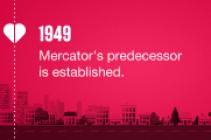
4. March 1949
On 4 March 1949, the Živila trading company was established in Ljubljana with a range of forty essential food items: lard, oil, sugar, salt, sardines, rum and UNRRA (United Nations Relief and Rehabilitation Administration) packages.
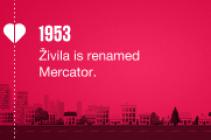
1953
The name “Mercator” was chosen in a public tender and was proposed by Aco Burger from the Chamber of Commerce. Mercator means “merchant” in Latin.
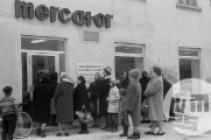
From 1953 to 1990
Mercator’s development during this period was characterized primarily by connections established with smaller local commercial, industrial, agricultural, catering, and service companies on the basis of interest, whereby all companies retained their legal independence. Author of photography: Marjan Ciglič, National Museum of Contemporary History
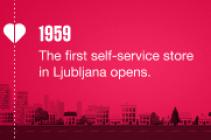
1959
On Friday, 27 November 1959, Mercator opened its first self-service store in Ljubljana.
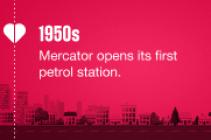
1950s
75 years after its establishment, Mercator owns 21 modern Maxen self-service petrol stations, which are open 24/7.
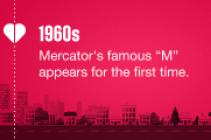
1960s
In the 1960s, Mercator created its current unified visual identity and logo – the capital M. The uniforms of Mercator employees were also standardised at this time – opting for the renowned combination of white and red.
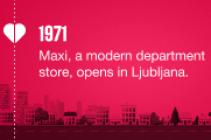
1971
On 23 November 1971, a modern two-storey department store called Maximarket opened its doors next to the newly built Republic Square. It had been designed by the famous architect Edvard Ravnikar. In the first four days, it was visited by more than 80 thousand people, and it was also frequented by Josip Broz Tito, the then President of the SFRY.
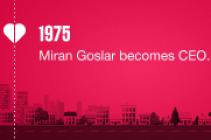
1975
In 1975, Miran Goslar became Mercator’s CEO and is today considered the “father of modern Mercator”. He ran the company until 1993 and had a vision for the Pika card long before the advent of loyalty cards. You can watch an interview with him on M Soseska.

1985
The first gift voucher in history appeared in the UK in 1932, while Mercator followed suit with its inaugural gift voucher in November 1985. They were available for 5,000 and 10,000 dinars, which would be equivalent to around €100 and €200 today.
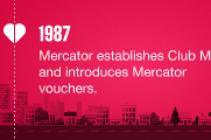
1987
In autumn 1987, Mercator established Club M and introduced Mercator vouchers. Mercator Club cardholders accrued interest of at least 70%, which could be redeemed at the nearest cashpoint.
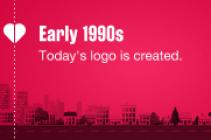
1990s
Since the 1990s, Mercator's logo has been characterized by a distinct red square featuring a white slanted letter M, divided in the centre.
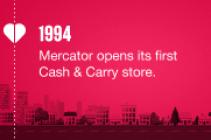
1994
Mercator wholesaling also celebrates a wonderful milestone: 30 years ago, its first Cash & Carry store was opened. The store provides the widest range of products throughout Slovenia at competitive prices for retailers, franchise customers, public institutions, and caterers.It also supplies the biggest hotels and pizzerias. In 2024, the wholesaling division will supply more than 140 franchise stores, 480 small retailers, and 5,200 catering establishments.
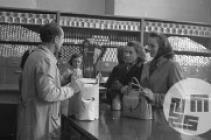
1993 to 1995
Mercator establishes capital ties with its subsidiaries – the beginning of organization into an affiliated group and the establishment of the name Poslovni sistem Mercator and in 1993 start of privatization with an initial public offering of shares, the largest privatization project in Central Europe by volume and value of capital. Privatization of Poslovni sistem Mercator d.o.o. company, the largest Slovenian joint stock company, is completed, with the ownership taken over by national funds and some 63,000 minority shareholders. Author of photography: Vlastja Simončič, National Museum of Contemporary History
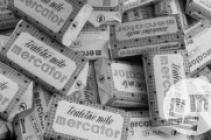
1997
A breakthrough year in company’s business operations, as it became one of the most successful trading companies in the former Yugoslav region. Poslovni sistem Mercator d.o.o. had operated with a loss and lacked a real vision up to 1997; in October of that year now, it got a new Management Board, headed by Zoran Janković. Upon assuming its duties, the new Management Board adopted an ambitious strategic development plan aimed at ending the negative orientation the company had taken during the previous years and creating the best trading company in the country, akin to the largest European and global commercial chains. Author of photography: Marjan Ciglič, National Museum of Contemporary History
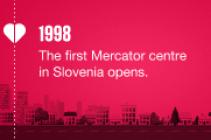
1998
In July 1998, after more than a year of construction, the first Mercator centre opened its doors in Slovenia – at Šmarska cesta in Koper. It covered over 12,500 square metres and was complemented by a parking garage with 600 parking spaces.
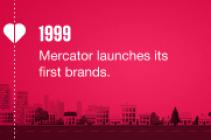
1999
This year, Mercator's brands celebrate their 25th anniversary: “Mizica, pogrni se”, “Zdravo življenje”, “Lumpi”, “Popolna nega”, and “Ambient”.
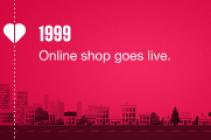
1999
On 15 April 1999, the first online shop in Slovenia was launched on the mercator.si domain – just five years after the world's first online shop.
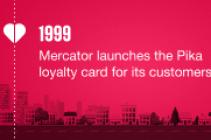
1999
In 1999, the Mercator Club issued its first blue and green Pika cards.Today, 25 years later, there are four versions: the temporary red Pika card, as well as the blue, green, and gold Pika cards. The latter provides everything from points collection and instant discounts to staggered payments, priority treatment, and a monthly special on selected purchases.
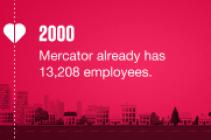
2000
For comparison: at the time of its establishment in 1949 there were 36 employees, while in 2009 Mercator's community numbered 21 thousand employees.
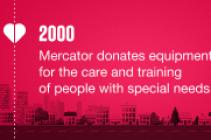
2000
As part of the "For a Thousand Happy Faces" initiative initiated by Mercator a year prior, in 2000 the company donated equipment to seven centres and institutions dedicated to the care and education of individuals with special needs. Between 1999 and 2003, Mercator donated more than €1 million to healthcare alone.
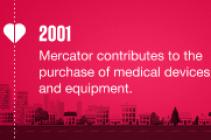
2001
At the end of 2001, Mercator started its traditional annual charity campaign, during which it purchased or helped purchase new ultrasound machines, cardiotocographs, delivery beds, and other medical appliances and equipment worth 65 million tolars (or €270 thousand) for 14 Slovenian maternity hospitals.
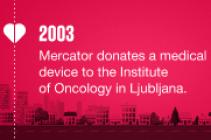
2003
Through its “Open your eyes” humanitarian campaign in 2003, Mercator donated a Gamma Med Plus device designed to treat certain types of cancer and worth 84 million tolars (or €350 thousand) to the Institute of Oncology in Ljubljana.
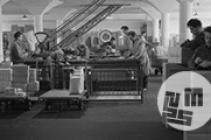
2004
In 2004, Slovenia entered the European Union. In spite of more stringent market conditions, Mercator’s operations were successful; it achieved a record income, increased its market shares across the markets it operated in, and ranked 32nd by income among all companies from the ten new member states. This year also saw the opening of the first Hura! discount store, the first discount store of the Mercator Group. Author of photography: Marjan Ciglič, National Museum of Contemporary History
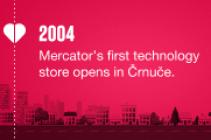
2004
The first branch of the Mercator M technology store was opened in 2004 at the site of today’s modern Mercator Technology and Construction Centre in Črnuče.
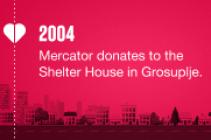
2004
During the summer of 2004, in collaboration with the Slovenian Association of Friends of Youth, Mercator unveiled a plan for the Shelter House crisis centre, addressing a crucial gap in the accommodation network for children awaiting placement in foster care or adoption. Mercator invested approximately 90 million tolars into the project (or just over €375 thousand).
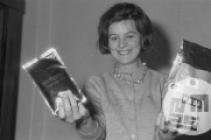
2005
In 2005, two major events in the Slovenian market had a strong and direct impact on Mercator Group operations: changes to the Trade Act regarding Sunday and holiday store opening hours (stores were now to be closed on Sundays and holidays), and the arrival of a foreign discount chain to the Slovenian market, which additionally increased the level of competition. The ownership structure changed considerably during this year, with the Supervisory Board having been replaced and a new Management Board appointed. The management of the Poslovni sistem Mercator d.o.o. company was assumed by a 4-member Management Board headed by Mr. Žiga Debeljak. Author of photography: Marjan Ciglič, National Museum of Contemporary History
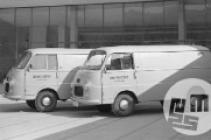
2006
With a strategic partnership with the Holding Rodič M&B company put in place in Serbia, Mercator became the second largest merchant in the country, reaching a market share of about 8% for the year. Author of photography: Janez Lampič, National Museum of Contemporary History
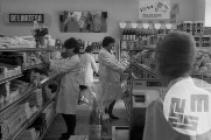
2007
In the beginning of 2007, the assumption of euro as the national currency was a milestone for Slovenia. Mercator, including its entire retail network, was excellently prepared for the conversion and carried out the transition smoothly. Mercator presented its range of tourist services M Holidays in Slovenia, entered a strategic alliance with the Croatian company Presoflex, and with the company Omega in Bosnia and Herzegovina. Mercator signed an agreement on strategic combination with the Montenegrin company Mex market, d.o.o.; as of January 1st 2008, this company was renamed to Mercator-Mex, d.o.o. Author of photography: Marjan Ciglič, National Museum of Contemporary History
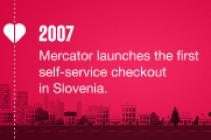
2007
In January 2007, Mercator was the first retailer in Slovenia to introduce a self-service cash register (TikTak). It was installed at the Mercator hypermarket in Celje, where four such cash registers were opened. Media lauded the technological sophistication of the device and added that self-service cash registers would soon be rolled out in Koper and Ljubljana as well.
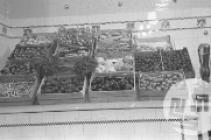
2008
Harsh business conditions made 2008 a very challenging year which saw high inflation in the first half of the year and a global financial crisis in the second half. Despite the exacting environment this was the year of record-breaking investment volume for Mercator Group which now operates a total gross sales area of over one million square meters; part of this area is leased to other service providers. In Serbia, Mercator acquired an additional 12-percent ownership share in the company M-Rodić, in Croatia, the Billa trade chain joined the Mercator-Plodine purchasing association, in Bosnia and Herzegovina, we entered a strategic partnership with the company Omega, d.o.o, and founded the company M-BL, d.o.o., Banja Luka. Consistently with the strategy of entering the Bulgarian market, we have founded the company Mercator-B, e.o.o.d., Sofia, which was in charge of Mercator's expansion to the Bulgarian market. Author of photography: Vlastja Simončič, National Museum of Contemporary History
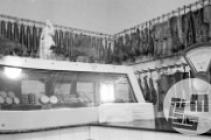
2009
Mercator has entered year 2009 as the largest FMCG retail chain in the entire region of Southeast Europe. We opened the first hypermarkets in Albania and Bulgaria, at the end of the year, has signed an agreement on strategic alliances with the company Getro in Croatia. The business in the region was still affected by the consequences of economic crises, but because of its stability Mercator carried out all planned investment and is open to new business opportunities for further growth and development. In 2009, Mercator celebrated its 60th anniversary. Customer satisfaction is confirmed by almost 1,4 million Mercator Pika loyalty card users. Mercator also one of the largest retailers of specialized technical program, clothing and sportswear. Author of photography: Vlastja Simončič, National Museum of Contemporary History
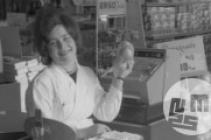
2010
Mercator’ activities in 2010 were focused in all markets of our on providing the broadest possible offer for the consumers. This included continuous work on preparing various favorable offers of products and services, emphasizing seasonal and theme-oriented offer and investing our efforts into development of our private label. In the Croatian market, the companies Getro, d.d., and Mercator-H, d.o.o., completed their strategic combination based on the agreement on the acquisition of the trade activities of the Croatian trade company Getro, d.d., signed by the partners involved on December 18th 2009. The strategic combination includes the purchase of the "Getro" brand and long-term operating lease of 16 Getro trade centers and other business facilities with a total area of over 120 thousand square meters. In Montenegro, the companies Pantomarket, d. o. o., and Mercator Group signed on June 30th 2010 an agreement on strategic alliance based on which the company Mercator-CG, d. o. o., Montenegro, took over the trade operations and employees, and the long term operating lease of 77 trade facilities owned by the companies Pantomarket, d. o. o., and Plus Commerce, d. o. o., in the market of Montenegro, with a total gross sales area over 31 thousand square meters. In Serbia, the companies Mercator-S, d. o. o., and Coka, d. o. o., signed on August 4th 2010 a strategic alliance agreement based on which the company Mercator-S, d. o. o., Serbia, is to take over the long-term operating lease and sublease of 22 trade facilities of the Coka Group in the Danube ("Podunavlje") region, with a total sales area of over 12 thousand square meters. The strategic alliance also includes the purchase of inventory and equipment, as well as employing all employees of the companies in the Coka Group. Author of photography: Marjan Ciglič, National Museum of Contemporary History
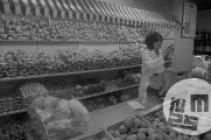
2011
In 2011, the Mercator Group continued to pursue its planned strategy of growth. On the Serbian market, Mercator strengthened its position as the second largest retailer by acquiring the trade operations of Familija Marketi, while Mercator BH strengthened its position as the third largest retailer in Bosnia and Herzegovina through a strategic combination with Drvopromet. With the acquisition of En Plus, renamed M-Energija, we are planning to develop supplementary trade activities, including the Maxen self-service petrol stations in the parking lots of major shopping centres, first in Slovenia and later in the entire region. This will achieve greater recognition and provide a more comprehensive offer for the end-consumer at a single location. In accordance with its medium-term plan, Mercator also launched the important project of monetizing its real-estate assets. Exploiting the potential of real estate for further growth is very important in order to ensure the successful operation of the Mercator Group. Author of photography: Edi Šelhaus, National Museum of Contemporary History
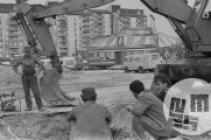
2012
In 2012, the market situation continued to be strongly affected by the economic crisis. A deep insecurity about economic recovery continues to be present and it remains difficult to obtain funding. Mercator has monitored the changes on the market on a regular basis and attempted to limit all the negative impacts as much as possible. The Management Board adopted a number of measures to achieve greater cost rationalisation and operational effectiveness. Accordingly, the Management Board established the key strategic goals – optimisation, profitability, focus and growth – that were integrated into all areas of our business operation. In accordance with our newly-developed strategy, we focused on our main activity, the sale of fast-moving consumer goods, and carried out the renovation of retail units and improved the mix of products and services as part of the project Refreshment of the FMCG Offer. Through the consistent implementation of the cost and operation rationalisation measures adopted, we achieved savings of EUR 10 million in the second half of the year. We also adapted to the harsh economic conditions by suspending unnecessary investment activities and continuing to acquire new retail areas, particularly by entering into new lease agreements. Due to incomplete answers provided by investors, the monetization project was brought to a halt and the project will resume once the market situation improves. Poslovni sistem Mercator d.o.o. increased its share in Vesna, Trgovsko podjetje, d.d., from 45 to 100%, thus acquiring 7 sales units, which have operated as Mercator franchise units thus far. At the end of 2012, Mercator launched activities for exiting the market of Albania due to the unprofitable operation of companies and a focus on improving the operation on key markets. Business units ceased operation on this market as of 31 December 2012. Exit from Bulgaria is also planned for 2013. A considerable change in the Group's organisational structure has also taken place with the change of the Supervisory Board and the appointment of the new Management Board. The management of Poslovni Mercator d.o.o. was taken over by a four-member Management Board chaired by Toni Balažič. Author of photography: Marjan Ciglič, National Museum of Contemporary History
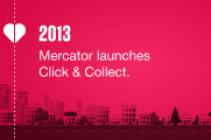
2013
Click & Collect, which was launched by Mercator in 2013, is a service that allows customers to order products from the online shop and collect them in-person at specific locations.
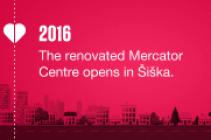
2016
The doors of the completely renovated and modernised Mercator Centre in Šiška open in mid-July 2016. The shopping centre was opened in 1999 and was first renovated and expanded in 2007.Following its second renovation, Mercator Centre Šiška now boasts 35,000 products, 5,000 of which are newly introduced.
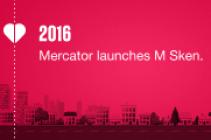
2016
As with many shopping experience innovations in Slovenia, Mercator was the first to introduce advanced shopping with M Sken (and the mobile version M Sken Mobile) in Slovenia and in the region. This service streamlines the shopping experience, enabling customers to scan products using either a handheld scanner or a smartphone, facilitating swift checkout without the need for rescanning items.

2017
Mercator was the first retailer to develop a mobile platform (Moj M). The main concept of the app was to bring all the benefits of the Pika card to smartphones. This year, the app has been completely revamped and now offers challenges for earning extra points, shopping lists, extra discounts with “Moja izbira”, a one-stop catalogue, and more.
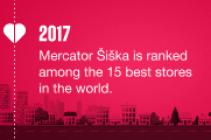
2017
In December 2016, the Institute of Grocery Distribution (IGD) ranked Mercator Centre Šiška among the top 15 stores in the world to visit in 2017. It is an elite list of excellence that includes Sainsbury's in London, Carrefour Saint Marcel in Paris, and 365 by Whole Foods Market in Los Angeles.
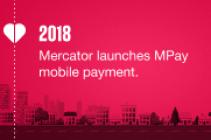
2018
In May 2018, Mercator upgraded the then still fresh Moj M app with the M Pay mobile wallet, which facilitatesuse of the Pika card on a smartphone – regardless of the operating system. Users could use the app to collect and redeem points, defer and stagger payments, redeem coupons, and make contactless payments with their phones.
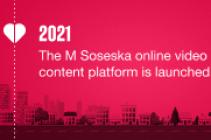
2021
On 18 February 2021, the free online video content platform M Soseska was launched. The aim of M Soseska is to combine entertainment and educational video content. The interactive content has created a unique video platform for lovers of cuisine, entertainment, creativity, sport, and culture. M Soseska is a regional project, and its first real regional TikTok talent show, called MTikTok Dance Academy, was extremely popular. The project also won the SOF 2021 Gold Award in the Digital Communications category and the WebSi 2021 Gold Award in the Innovative Creators of the Future category.
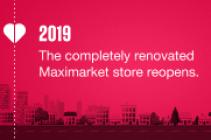
2019
In October 2019, Mercator unveiled a completely renovated self-service section in the Maxi department store named Maxi Gourmet. The renovated section is 20% bigger and extends to over 2,600 square metres. Maxi Gourmet was designed as a gourmet shop, yet it also features street food, homemade dishes, a sushi corner, a gourmet pizzeria, and a fish shop. As part of the “Radi imamo domače” brand, Mercator incorporated more than 1,200 products sourced from over 100 Slovenian suppliers.
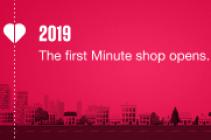
2019
In December 2019, Mercator opened a newly renovated store in the Congress Square in Ljubljana, where it offered a wide range of Minute products, designed for “takeaway” and mainly targeting those who need a quick breakfast or a simple snack on their way to work or school.
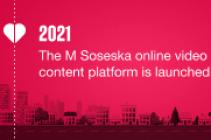
2021
On 18 February 2021, the free online video content platform M Soseska was launched. The aim of M Soseska is to combine entertainment and educational video content. The interactive content has created a unique video platform for lovers of cuisine, entertainment, creativity, sport, and culture. M Soseska is a regional project, and its first real regional TikTok talent show, called MTikTok Dance Academy, was extremely popular. The project also won the SOF 2021 Gold Award in the Digital Communications category and the WebSi 2021 Gold Award in the Innovative Creators of the Future category.
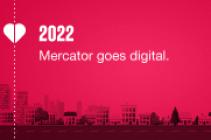
2022
In 2022, Mercator unified communications among all its employees by launching the new, state-of-the-art mi.Mercator platform, which serves as a central channel for communication, provides access to useful tools, connects to other internal applications, and digitizes all back-office processes. The digitalisation of the business, which is an important step in improving operational efficiency, is one of Mercator's many initiatives to stay one step ahead as a company.
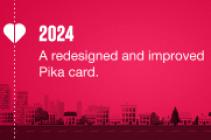
2024
As of 1 February 2024, Mercator’s Pika loyalty programme has been redesigned and improved. There are new ways to earn points with monthly challenges, and the linking of the Pika card to the Moj M app and the promotions it offers is further enhanced. Moja izbira is a new feature where Pika users choose 10 products they have been buying over a number of weeks and get at least 20% off. By continuously improving and expanding its product range, Mercator continues to strengthen its bond with customers, set new standards, and solidifies its role as an innovator in the industry.
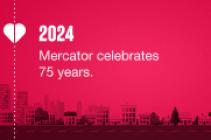
2024
This year marks three quarters of a century since the beginnings of everyone's favourite neighbour. Today, Mercator employs more than 8,000 people in Slovenia, has more than 40,000 different types of products on its shelves, and sees 5 million purchases made every year. The slogan for the anniversary campaign is "A good world begins with good neighbours”, highlighting our commitment to our communities and the significant impact of being a good neighbour.
